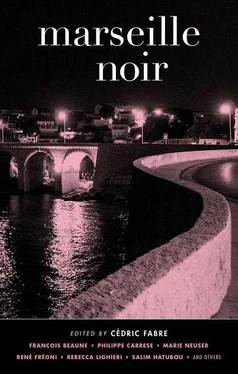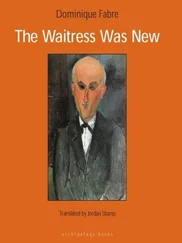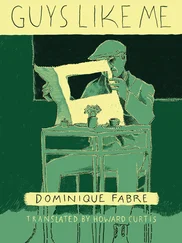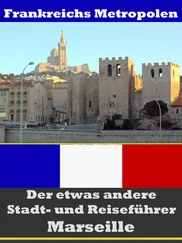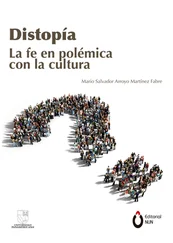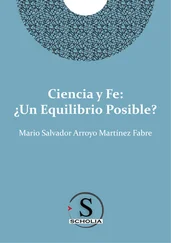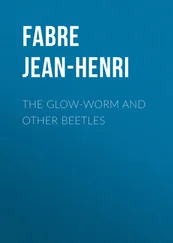Cédric Fabre - Marseille Noir
Здесь есть возможность читать онлайн «Cédric Fabre - Marseille Noir» весь текст электронной книги совершенно бесплатно (целиком полную версию без сокращений). В некоторых случаях можно слушать аудио, скачать через торрент в формате fb2 и присутствует краткое содержание. Год выпуска: 2015, Издательство: akashic books, Жанр: Крутой детектив, на английском языке. Описание произведения, (предисловие) а так же отзывы посетителей доступны на портале библиотеки ЛибКат.
- Название:Marseille Noir
- Автор:
- Издательство:akashic books
- Жанр:
- Год:2015
- ISBN:нет данных
- Рейтинг книги:5 / 5. Голосов: 1
-
Избранное:Добавить в избранное
- Отзывы:
-
Ваша оценка:
- 100
- 1
- 2
- 3
- 4
- 5
Marseille Noir: краткое содержание, описание и аннотация
Предлагаем к чтению аннотацию, описание, краткое содержание или предисловие (зависит от того, что написал сам автор книги «Marseille Noir»). Если вы не нашли необходимую информацию о книге — напишите в комментариях, мы постараемся отыскать её.
Marseille Noir — читать онлайн бесплатно полную книгу (весь текст) целиком
Ниже представлен текст книги, разбитый по страницам. Система сохранения места последней прочитанной страницы, позволяет с удобством читать онлайн бесплатно книгу «Marseille Noir», без необходимости каждый раз заново искать на чём Вы остановились. Поставьте закладку, и сможете в любой момент перейти на страницу, на которой закончили чтение.
Интервал:
Закладка:
Ange and I were the same age. In the Malatesta family, he was the youngest, five years younger than his youngest sister. He was very dark too — the family was Sicilian — with big eyes lined with long black eyelashes. He laughed a lot, and loved to sing the hits of the day at the top of his unbearably shrill voice. It irritated his sisters and the whole neighborhood too. I particularly remember a Mexican song Henri Salvador had adapted, “Juanita Banana,” where Juanita sang an aria (from Rigoletto, I would learn years later), which Ange would sing for days on end in a voice that literally pierced your eardrums.
We lived at the bottom of the path leading up to Roucas Blanc, almost on rue d’Endoume, in a little dead end of gray tar, next to a plumber’s workshop where I would sometimes play with the boss’s son, a little blond kid named Denis Fornasero. On the other side there was a grocery store run by a gentle, mute Algerian couple, Leila and Saïd Bijaoui, who didn’t have any children; I learned later that they’d had a son who was killed in the Algerian War. Maybe that’s why their eyes looked so very sad. The Malatestas lived right across the street, as did the Fabrizios (their son René was more Ange’s friend than mine and he sometimes invited Ange over); there was also the Ollives, the Nicolaïs, the Mattéis, the Lacépèdes, and the Pagès — all families I knew less well, since they didn’t have any kids my age. A little farther toward boulevard Tellène, there was the Girard family. Their son François was ten years older than me. He played in the Endoume soccer club and was pretty good. He called himself Francis, I never knew why. A good-looking guy, blond with light eyes, who could get any girl he wanted. He kind of fascinated us, Ange and me.
I never knew exactly what the mental problems of the four Joes were, but I remember that one afternoon when we were playing in our street (Thursday was then the day off from school), Ange told me, looking dejected, that the day before, when he happened to be alone at home with his sisters a little before their mother got back, one of them had suddenly started to crawl over the dining room rug, crying and spitting like a cat, while another one danced naked and another meticulously tore apart the leaves of their plants, humming a tune of Luis Mariano’s under the watchful eyes of the last one, who was sucking her thumb and stroking her hair. When their mother got there, she called an ambulance and three of the sisters left the house. So only one remained that day: I’ll call her Josette for convenience, though I’m not absolutely sure she was really the one.
Josette liked me and so did the three other Jo sisters, although she never remembered my name. And in fact, since the four sisters were interchangeable in my eyes, I’d be better off using an original grammatical form when I talk about Josette, fusing the singular with the plural: “Josettes liked me,” for example. Or, “Josette liked me, although they never remembers my name.” However it may be, this girl was like a condensed version of the four, as if Jocelyne, Josiane, Josephine, and Josette were suddenly put together in one body, which I had decided, with all the confidence of my nine years of age, to call Josette.
At the time I was going to the elementary school on rue Candolle, on the other side of rue d’Endoume — just like Ange, but we weren’t in the same class. As for the Jo sisters, they were old enough to go to lycée (at that time high school and junior high were combined), but I’m not sure their condition allowed them to attend school at all. Today, I no longer remember. What I do remember is that a little later that same Thursday afternoon, I found myself alone with Josette. Her father was at a construction site, her mother probably at the hairdresser’s, the three other sisters in the psychiatric unit of La Timone Hospital, and the brother had gone to his neighbor René Fabrizio’s to look at his collection of Norev car models. (René was a tall, skinny kid with pale skin and a freckled face who spoke very fast and was crazy about cars.) My parents weren’t home either. My mother was out that day visiting her sister, who’d just had her appendix removed at La Conception Hospital. As for my father, he was rarely there anyway.
So I was alone at the Malatesta’s, with Josette. I was reading The Secret of the Unicorn while she was silently playing with her hair on the flowery couch in the living room with a magazine she wasn’t reading on her naked knees. She was staring at me in a strange, slightly sorrowful way. I pretended not to see anything when she slowly raised her dress to the top of her thighs, which were brown and slender. From the corner of my eyes, I caught a glimpse of the white, scalloped bottom of her panties. I didn’t react when she walked over to me either, swaying her hips in an exaggerated way. But I was vaguely terrified: she was tall, and I was only a shy, embarrassed little boy. She kept on twisting the long locks of her shiny black hair between her fingers. She sat down right next to me. She smelled nice: shampoo and milk soap. I pretended to go on reading Tintin, and persisted in not reacting when she began to cry silently, murmuring some words I couldn’t quite understand. Then she stroked my thigh. The Bird Brothers were trying to kill Tintin in the underground passages of Moulinsart, but I wasn’t really paying attention to that; I was just mechanically turning the pages as if nothing was happening. Josette put her head on my shoulder while continuing to stroke me through my shorts. She murmured other words that I couldn’t understand. Her hand slipped into the opening of my shorts. It was soft. I felt my little penis rising. She took it carefully between her fingers, kept on stroking it gently, and then leaned over toward it, surrounding it in a humid sheath. I closed my eyes and forced myself not to move an inch.
That’s when Ange came in. Josette jumped back and began to whimper. Then she sprang up and ran into her room. As for me, I was paralyzed, like a rabbit caught in the headlights of a car. But I did have the presence of mind to drop The Secret of the Unicorn on my thighs. I’d been squeezing it against my chest, right above Josette’s curly hair. Ange froze and gave me a dark look that scared me a little. I had never seen his eyes like that, intense and hostile at the same time. In fact, I had never known him to be so serious; usually, anything would make him laugh. I was confused about that look I’d never seen before; he was suddenly rising above his age, our age: it was a grown-up look, not the look of a nine-year-old child. Then he put his keys down on the little table at the entrance and said nonchalantly, “What’s her problem now?”—and without waiting for an answer, he became a little boy again and told me about René Fabrizio’s collection of Norevs.
At that time Endoume was a village. I’m talking about East Endoume, the Roucas Blanc — Saint-Victor — Corderie side, not to be confused with West Endoume on the Corniche side, which was the hip part of the neighborhood. In fact, Marseille was less a city than a patchwork of villages, each one with a clearly defined identity. In general, each of these villages ignored the existence of the others. It was useless to speak of La Belle de Mai to the residents of Sainte-Marguerite, of Canet to the people of Endoume (East or West), of Montredon to the people of L’Estaque, of the Aygalades to the people of Saint-Barnabé: at best these were places where they’d never set foot, and at worst they considered it useless, even degrading, to go there. Only the Canebière and the Vieux-Port, which made up the tiny city center of what was nonetheless the second largest city in France, were common to everyone — or almost everyone.
Читать дальшеИнтервал:
Закладка:
Похожие книги на «Marseille Noir»
Представляем Вашему вниманию похожие книги на «Marseille Noir» списком для выбора. Мы отобрали схожую по названию и смыслу литературу в надежде предоставить читателям больше вариантов отыскать новые, интересные, ещё непрочитанные произведения.
Обсуждение, отзывы о книге «Marseille Noir» и просто собственные мнения читателей. Оставьте ваши комментарии, напишите, что Вы думаете о произведении, его смысле или главных героях. Укажите что конкретно понравилось, а что нет, и почему Вы так считаете.
